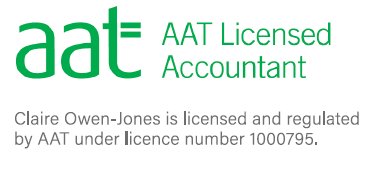No business is too small for a bit of bookkeeping.
However, when you're just starting out it can be hard to know what you need to do. Or even, what needs to be done.
So here are my quick fire, tip 13 tips for anyone new to record keeping.
1. Make sure you have a business bank account.
It doesn't matter if you have one sales invoice and three expenses a month, get into the habit of keeping things separate. It will help you with your accounting, it will help you understand your business and it will help you should HMRC ever make an enquiry.
2.Bin the cheque book
No one likes receiving cheques and from an audit trail purpose they are a nightmare. You need to keep the finished cheque books, you need to complete the stubs and you need to use handwriting that someone other than yourself can read.
3.Keep an eye on the cash
It’s so easy to get paid £100, take that home and then it kind of vanishes. From a bookkeeping point of view, cash can so easily go “off record”. This means that it’s harder to know if a sales invoice has been paid and it’s harder to prove if it has been spent on expenses. So, it can mess up your figures and result in you paying more tax.
4.Pay for everything using one bank account
It’s so easy, especially when you are a small sole trader, to pay for the occasional expense through your own bank account. Then in cash. Possibly pop a business purchases onto a personal shop. Use PayPal and so on. Now if you don’t keep receipts for these things and make it clear what is a business expense, they will be omitted from your accounts and you’ll pay more tax.
5.Don’t use your business bank account to pay for personal expenses
So often I see a sneaky Netfix subscription appear. Maybe the gym. A holiday… Keep your business account for business expenses only. Try to take only lump sums from your business account. It makes a lovely audit trail and it helps you to plan cash flow.
6.If you trade through a Limited Company, make sure you understand what this entails
Being a sole trader is different to trading through a Limited Company. Speak to your accountant. Do some research. An easy example is motor expenses. If you have a Limited Company, then unless you have a company car you can only claim mileage. Do not pay for petrol, or repairs, insurance and services through the Limited Company. This is your expense, not the businesses.
7.Think of doing some bookkeeping – even just a teeny tiny bit
A box of receipts will always be a box of receipts. Now we know that HMRC’s Making Tax Digital is looming but as no one (including HMRC) really knows what it will entail, don’t feel as though you should rush onto a cloud software package. Keep it in mind but excel is fine as a starting point. VT Cashbook is also good is you want a free and simple desktop package.
8.Record your sales
If you use excel, I recommend starting with three columns for your sales and those are: customer, date invoice raised and then date paid. It should take seconds to complete, especially when you are only raising a handful of invoices a month but it will help you to easily identify slow payers, non-payers and great payers.
9.Keep an eye on your sales levels
The VAT threshold is calculated on a rolling 12 months, so don’t think this is something that you can look at every year when your accountant prepares your accounts. You could take on one large project and that could take you over the £83,000 limit, so if you’re getting close to this, be VAT aware.
10.Record your purchases
Purchases and expenses are always more time consuming to record as you generally have more of them. From a bookkeeping point of view, telling me what the expenses are for is very important. I’m not going to know what “Amazon” is for so without a receipt there is a chance that I’ll put these through as personal expenses… and you’ll pay more tax.
11.Keep an eye on your Gross Profit percentage
This is a dull accountancy one but it’s very important, especially if you work on projects. To calculate this, divide your gross profit (sales less costs) by the sale(s). It’s a good one because often you’ll price a job with the hope of making, say 50% profit. If you do this calculation and you find you’re making 30% profit, ask why. Are jobs taking longer than expected? Are they costing more to complete? If something is going wrong with your pricing the quicker you can stamp it out the better.
12.Save for tax
Get into the habit of putting a little aside each month for your tax bill. I would open a separate account for this (if you are a Limited Company, make sure this account is also in the Limited Company name). There isn’t a fixed percentage that I can give you as it will depend on your income levels but 15% of each sale is a good place to start. Also, try to get your accounts completed as soon as you can after the year end so you’ve got plenty of time to adjust your savings and have the money ready.
13.Three more things:
a) Get an accountant – one who you like, who you can afford and who you feel comfortable talking to. You will pay more tax doing things yourself. Trust me.
b) Don’t take tax advice from a friend who isn’t an accountant.
c) Tax is a consequence of making a profit. Never make a business decision to reduce your tax bill, make a business decision to improve your business.







